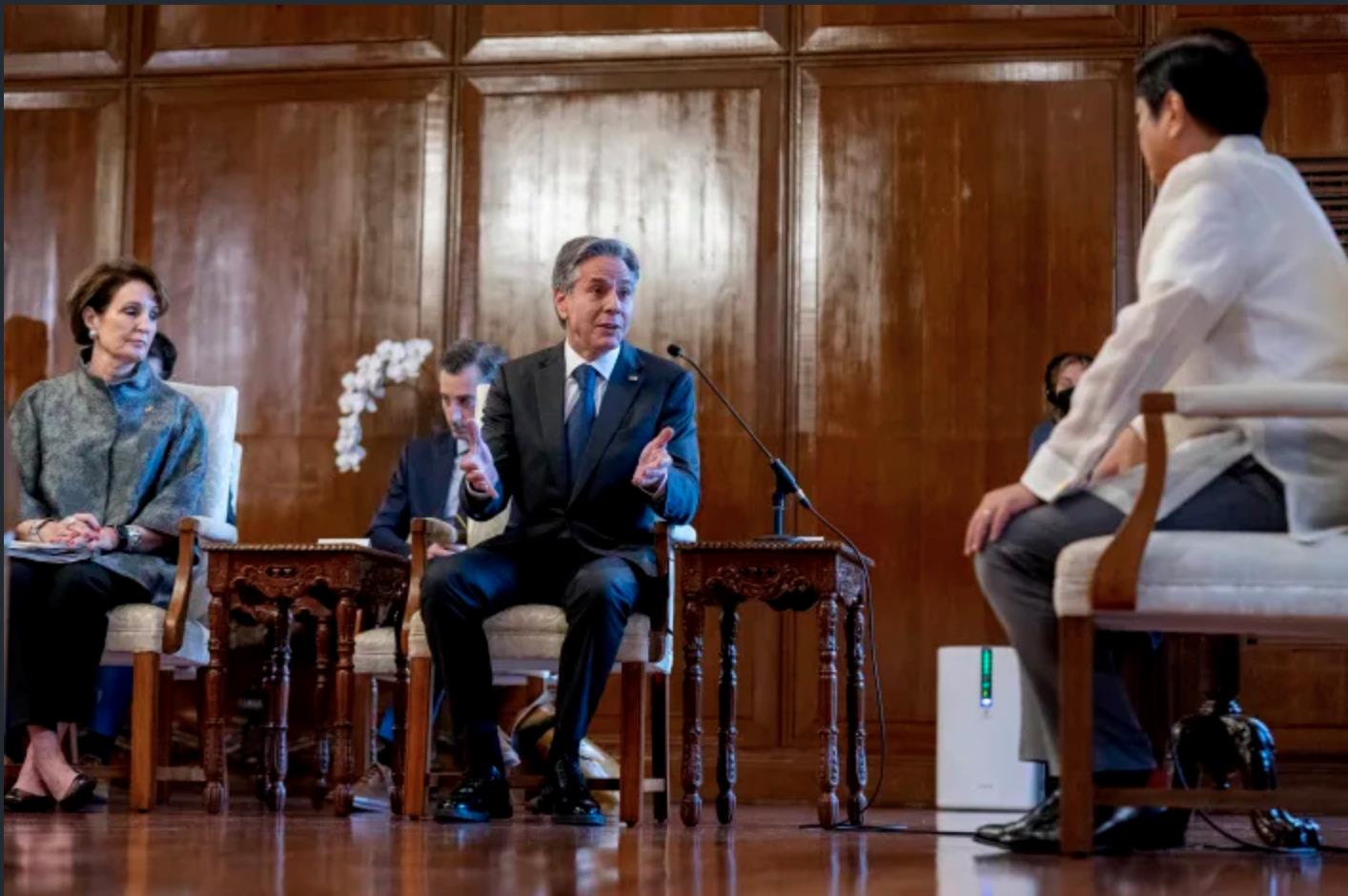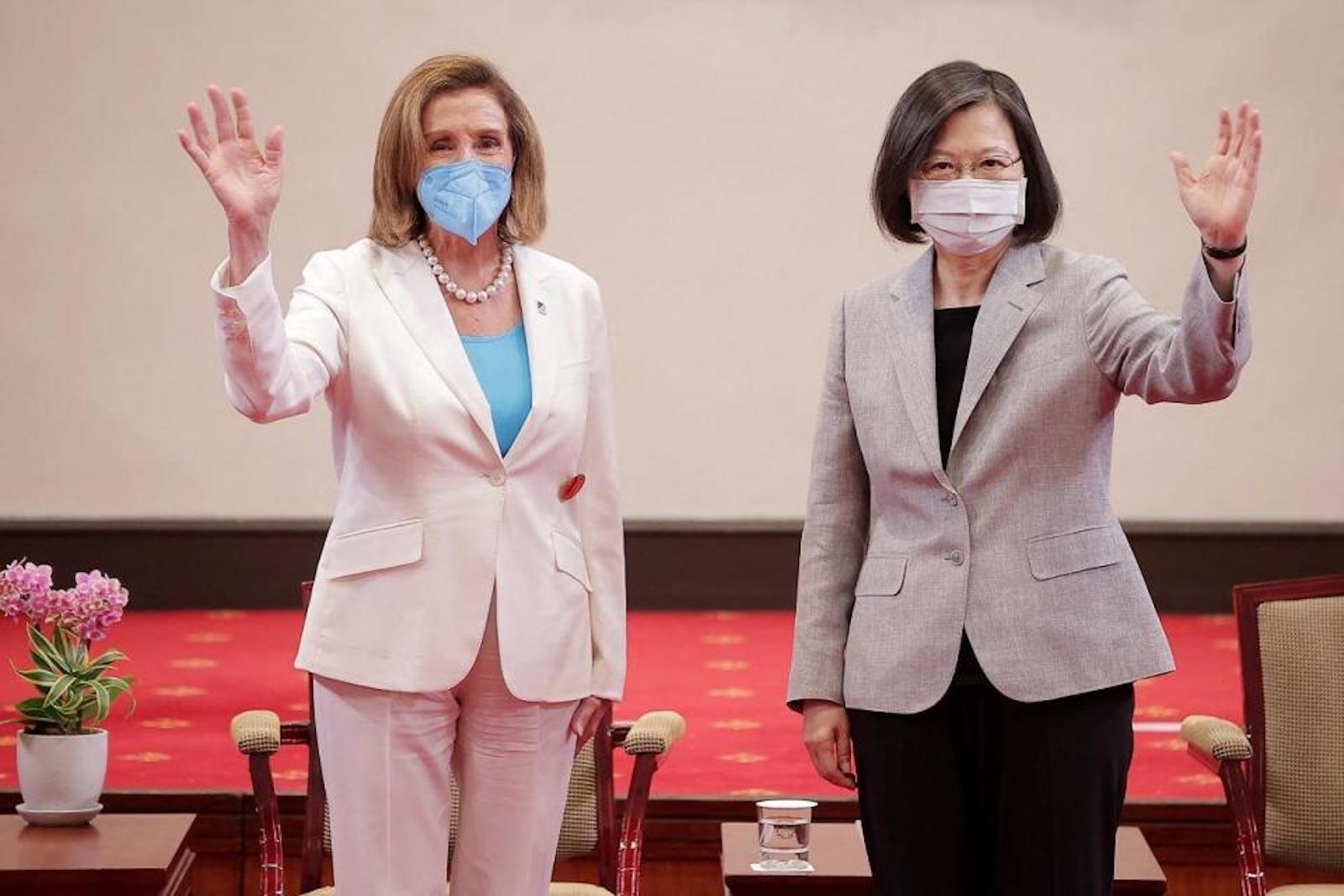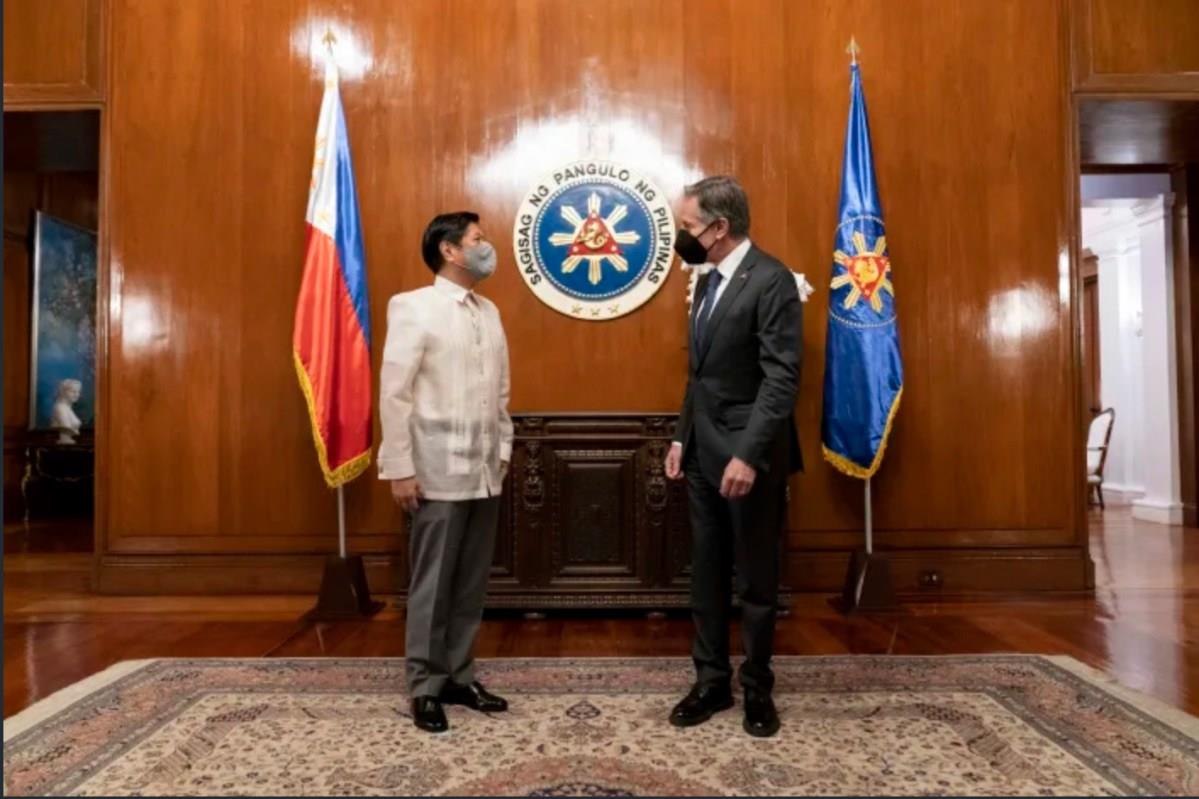
US, Philippines Flex Alliance In Heat Of Taiwan Crisis
MANILA – Philippine President Ferdinand Marcos Jr officially opened a new chapter in his family's longstanding and often fraught relations with the US when he warmly welcomed US Secretary of State Antony Blinken to the Malacañang Palace over the weekend.
The meeting was held in the same halls that the Marcoses fled 36 years earlier aboard a US Air Force plane in order to escape the wrath of the“people power” revolution that toppled Marcos Jr's father's once menacing dictatorship.
It marked the first-ever in-person meeting between the new Filipino president and a US cabinet member; it was also the first time that Blinken visited Manila since becoming America's top diplomat. Weeks earlier, Marcos Jr held conversations with Deputy Secretary of State Wendy Sherman as well as a phone conversation with US President Joe Biden.
“We cannot, we can no longer isolate one part of our relationship from the other. We are too closely tied because of the special relationship between the United States and the Philippines and the history that we share,” the Filipino president told Blinken.
The two allies underscored how“extraordinary” and“important” their bilateral relations are, significantly amid particularly turbulent times in the region. Eager to underscore a new chapter in Philippine-US relations following six years of roller-coaster ties under former president Rodrigo Duterte, Marcos Jr reassured Blinken that the US-Philippine alliance is rock solid.
“To be perfectly candid, I did not think it raised the intensity, it just demonstrated it – how the intensity of that [the Taiwan] conflict has been. It actually has been at that level for a good while, but we got used to it and put it aside,” the Filipino president added, subtly rejecting Beijing's criticism of US House Speaker of Representatives Nancy Pelosi's visit to the self-governing island last week as the main reason behind the latest crisis in the Taiwan Straits.
Blinken was visibly pleased with Marcos Jr's remarks, which by certain readings represent a policy course shift from his predecessor. Just a year earlier, the Biden administration tirelessly scrambled to prevent Duterte from nixing the Philippine-US Visiting Forces Agreement (VFA), which governs large-scale military exercises between the two allies.

Secretary of State Antony Blinken and US Ambassador to the Philippines MaryKay Carlson (L) meet with Philippine President Ferdinand Marcos Jr (R) at the Malacanang Palace in Manila, August 6, 2022. Photo: Pool / Agencies
Sensing a restoration of the once-robust alliance, Blinken described the Philippines as an“an irreplaceable friend, partner and ally” while reassuring his hosts that“an armed attack on Philippines' armed forces, public vessels, or aircraft in the South China Sea would invoke US mutual defense commitments under that (Mutual Defense) treaty.”
Blinken visited the Philippines right after attending a high-stakes meeting of the Association of Southeast Asian Nations (ASEAN) foreign ministers meeting in Cambodia. The European Union foreign policy chief Josep Borrell, Russian Foreign Minister Sergei Lavrov, and Chinese Foreign Minister Wang Yi were also among top diplomats at the event.
Along with other key Western allies, the top US diplomat encouraged Southeast Asian states to assert“ASEAN centrality” and help de-escalate rising tensions in the region. In response to Pelosi's visit, China has conducted massive military drills in the South China Sea and waters surrounding Taiwan, while restricting trade with the self-governing island and announcing sanctions against Pelosi herself.
Beijing also indefinitely suspended a whole gamut of confidence-building measures and strategic dialogues with Washington.
While ASEAN nations refused to take sides in the brewing conflict, they nevertheless warned against any“provocative action” that“could lead to miscalculation, serious confrontation, open conflicts and unpredictable consequences among major powers.”
Speaking on behalf of ASEAN nations, Kung Phoak, Cambodia's deputy foreign minister, urged both sides to stabilize the situation, making it clear that“[w]e hope de-escalation happens… and normalcy returns to the Taiwan Strait.”
Likely irked by explicit support from ASEAN nations, if not an implicit criticism of Beijing's latest military actions, Chinese Foreign Minister Wang Yi reportedly staged multiple walkouts during the meeting in Cambodia.
One of them, in tandem with his Russian counterpart, was in response to a speech by Japanese Foreign Minister Yoshimasa Hayashi, whose government warmly welcomed Pelosi to Tokyo last week and has publicly criticized China's missile tests and naval drills in the region.
The relatively tough language from ASEAN reflected its member states' acute sense of vulnerability and anxiety amid rising tensions over Taiwan. This is particularly true for the Philippines, which is separated from Taiwan by only a narrow strait and is also a major claimant in the South China Sea, where China has been conducting large-scale drills to protest Pelosi's visit to the self-ruling island.

US House Speaker Nancy Pelosi (L) waving beside Taiwan's President Tsai Ing-wen. Photo: Handout
As a US treaty ally and one of the few regional states that have robust defense relations with Japan and Australia, the Philippines would inevitably be dragged into any major conflict over Taiwan. Although the US no longer has permanent bases in the Southeast Asia country, the Pentagon enjoys rotational access to a whole host of military facilities across the Philippines.
Last year, the two allies scheduled more than 300 joint military activities , more than any of Washington's allies and partners in the Indo-Pacific. The US, along with Japan, South Korea and India, have also been aiding the Philippines' military modernization program , which includes the acquisition of frigates, fighter jets, surveillance aircraft and supersonic missile systems.
Despite acrimonious diplomatic relations under Duterte, who repeatedly threatened to end the US-Philippine defense treaty amid disagreement over human rights issues, the two allies also managed to fully restore the VFA during US Secretary of Defense Lloyd Austin's visit to Manila last year.
Nevertheless, the former Filipino president stood by his earlier pledge never to visit the White House while in office. More crucially, the two allies also squabbled over the full implementation of one key military deal, namely the Enhanced Defense Cooperation Agreement (EDCA).
Throughout his term in office, Duterte refused to allow Americans to, as per the EDCA, preposition weapons systems in and expand rotational military access to strategically-located bases close to the South China Sea.
This significantly hampered the Pentagon's plans to enhance America's forward deployment presence close to the disputed waters, especially through prized locations such as the Bautista Airbase (near the Spratlys) and Basa Airbase (near the China-occupied, Philippine-claimed Scarborough Shoal).
In stark contrast to his predecessor, Marcos Jr has shunned any criticism of Washington in any of his major speeches throughout the year, whether as a presidential candidate or following his inauguration as the new occupant of the Malacañang Palace.
If anything, the new Filipino president has welcomed expanded strategic and economic ties with Washington, earlier greenlighting Manila's participation in Biden's Indo-Pacific Economic Framework.
Following his meeting with Sherman, who reassured the new Filipino president of sovereign immunity against pending legal cases against the Marcos family in US courts, Marcos Jr is considering the White House as one of his first major foreign destinations.
Ahead of Blinken's visit, the new US Ambassador to Manila MaryKay Carlson held a cordial conversation with the new Filipino president, underscoring her commitment to enhance“the bond between our great nations.”
The new US envoy told Marcos Jr, who is facing multiple court cases in the US over allegations of widespread human rights violations and corruption during his father's tenure, that Washington is“here to help, and invested in your success.”
With that assurance in hand, Marcos Jr has warmly welcomed a further expansion in bilateral relations.
“[The Taiwan crisis] just demonstrates how volatile the international diplomatic scene is not only in the region…this just points to the fact of the importance of the relationship between the United States and the Philippines,” Marcos Jr told Blinken during their meeting in Malacañang on Saturday (August 6).
“I hope that we will continue to evolve that relationship in the face of all the changes we have been seeing,” he added, raising the potential of more robust defense cooperation under his watch.
As a sign of those warming ties, the Philippines has resurrected the long-shelved plans for joint patrols with the US across the South China Sea.

A Philippine Marine after fast-roping out of an MV-22B Osprey tiltrotor aircraft at Basa Air Field, January 22, 2016. Photo: US Marine Corps via Twitter
“In our view, joint patrols between the Philippines and the [US] can take place. They are under the ambit of the MDT, and also within the context of the Mutual Defense Board and Security Engagement Board. So, I think this is an issue that we'll continue to explore bilaterally,” Foreign Affairs Secretary Enrique Manalo told Blinken during their virtual press conference.
Manalo, who has been in isolation after testing positive for Covid-19, is the first career diplomat to lead the crucial department in almost two decades.
A traditionally-minded diplomat and a former ambassador to the United Nations in New York, Marcos Jr's top diplomat described the US as a “dear friend” and discussed a range of high-level meetings between the two countries in the coming months, including the possibility of an informal summit between Marcos and US President Biden on the sidelines of the upcoming United Nations General Assembly in New York.
The two sides also discussed Marcos Jr's potential visit to the White House in the near future while preparing for the next round of 2+2 meetings between US and Philippine defense and diplomatic chiefs sometime in early 2023. Expansion of defense ties, including the full implementation of EDCA, will likely top the agenda during the next strategic dialogue between the two long-time allies.
Follow Richard Javad Heydarian on Twitter at @richeydarian

Legal Disclaimer:
MENAFN provides the
information “as is” without warranty of any kind. We do not accept
any responsibility or liability for the accuracy, content, images,
videos, licenses, completeness, legality, or reliability of the information
contained in this article. If you have any complaints or copyright
issues related to this article, kindly contact the provider above.


















Comments
No comment